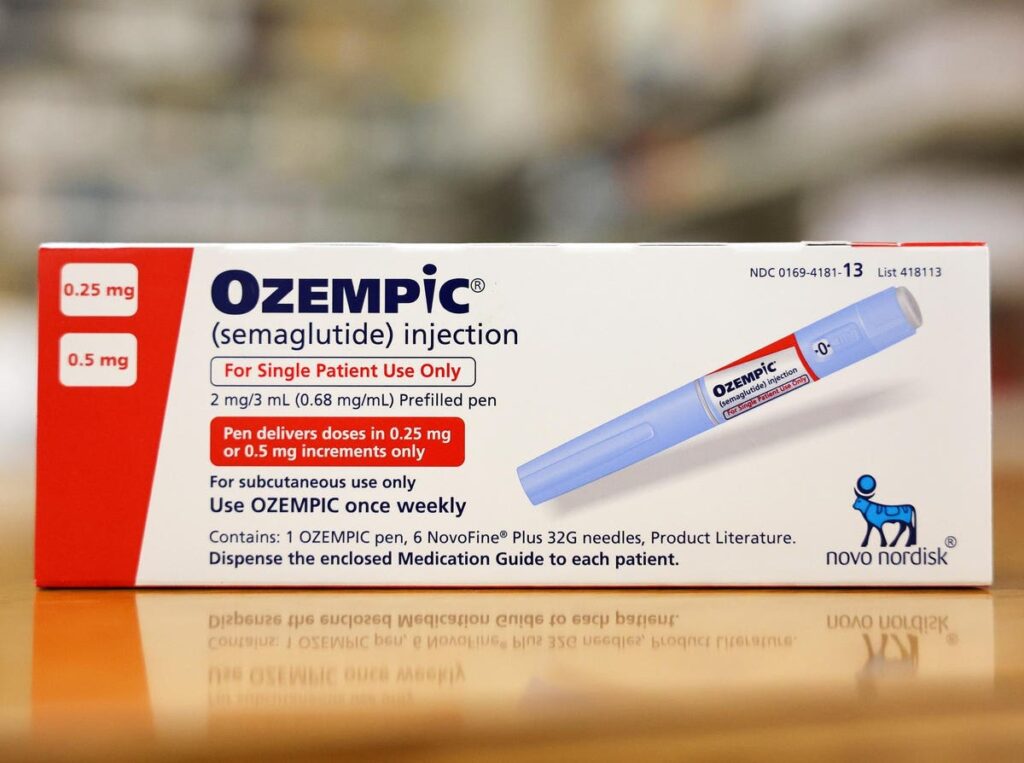Topline
GLP-1 diabetes and weight loss medications like Ozempic, Wegovy and Saxenda are being investigated by the European Union for causing suicidal thoughts, and while drug manufacturer Novo Nordisk denies a connection between suicide and its drugs, some studies and case reports suggest there could be a potential link.
In this photo illustration, a box of the diabetes drug Ozempic rests on a pharmacy counter.
Key Facts
A phase three clinical trial on Saxenda found suicidal thoughts were one of the drug’s most severe side effects—other serious side effects include renal impairment, pancreatitis and gallbladder disease.
In the U.S., prescribing information for Saxenda recommends monitoring patients for suicidal thoughts and depression and to discontinue use if symptoms appear.
Though Ozempic’s prescribing information doesn’t have this recommendation, Wegovy’s information does—and Wegovy is the same medication as Ozempic, just prescribed at higher doses.
In a statement to CNBC, drug manufacturer Novo Nordisk denied claims that its drugs caused suicidal thoughts, saying data from trials and post-surveillance doesn’t show a connection between semaglutide (generic name for Ozempic and Wegovy) and liraglutide (generic name for Saxenda) and “suicidal and self-harming thoughts.”
News Peg
The European Medicines Agency is investigating Novo Nordisk after several patients taking Ozempic and Saxenda reported thoughts of self-harm. The agency will investigate the potential mental health side effects of GLP-1 drugs containing semaglutide and liraglutide. On Tuesday, the EMA announced the investigation will extend to other GLP-1 receptor agonist medicines, like Wegovy. The agency is reviewing 150 reports of cases of possible suicidal thoughts and self-injury. The probe is expected to end in November. Novo Nordisk told CNBC “patient safety is a top priority,” and denied a link between suicidal thoughts and its drugs.
Key Background
Manufactured by Novo Nordisk, both Ozempic and Wegovy are once-weekly injections used to regulate blood sugar in type 2 diabetics. Though only Wegovy is FDA approved for weight loss, some doctors prescribe Ozempic off-label for weight management. Saxenda is a once-daily injection approved for weight loss and also manufactured by Novo Nordisk. Although all three medications’ main side effects are gastrointestinal issues, there have been several reported cases of suicidal thoughts from patients while taking these medications. According to the Food and Drug Administration’s Adverse Event Reporting System Public Dashboard, since 2018 there have been 60 reported cases of suicidal ideation and seven suicide attempts from patients taking semaglutide. There have been 71 cases of suicidal ideation and 28 cases of suicide attempts from patients taking liraglutide since 2010. In a study published in Drug Design, Development and Therapy, researchers warned against prescribing semaglutide to patients with a history of suicidal attempts or active suicidal thoughts.
Tangent
In clinical trials for semaglutide and liraglutide, patients were excluded from studies if they had a history of suicidal attempts, suicidal behavior within 30 days of screening, a history of depression within two years of screening and diagnosis of any severe mental health disorder, like schizophrenia or bipolar disorder.
Surprising Fact
There have been several suicide attempts by using GLP-1 receptor agonists—a of type 2 diabetes medicine that is often used for weight management—with the first known case being a 33-year-old Japanese woman who attempted suicide using liraglutide, according to a study published in Diabetes Research and Clinical Practice. Suicide also was linked to exenatide, another GLP-1 receptor agonist, as a cause of death in a clinical trial published in Diabetes Care.
Further Reading
EU Investigates Ozempic Maker After Reports Of Suicidal Thoughts (Forbes)
What To Know About Ozempic: The Diabetes Drug Becomes A Viral Weight Loss Hit (Elon Musk Boasts Using It) Creating A Shortage (Forbes)
Wegovy Shortage: Drug Maker Limits Distribution—Here’s When Supplies Should Improve (Forbes)


